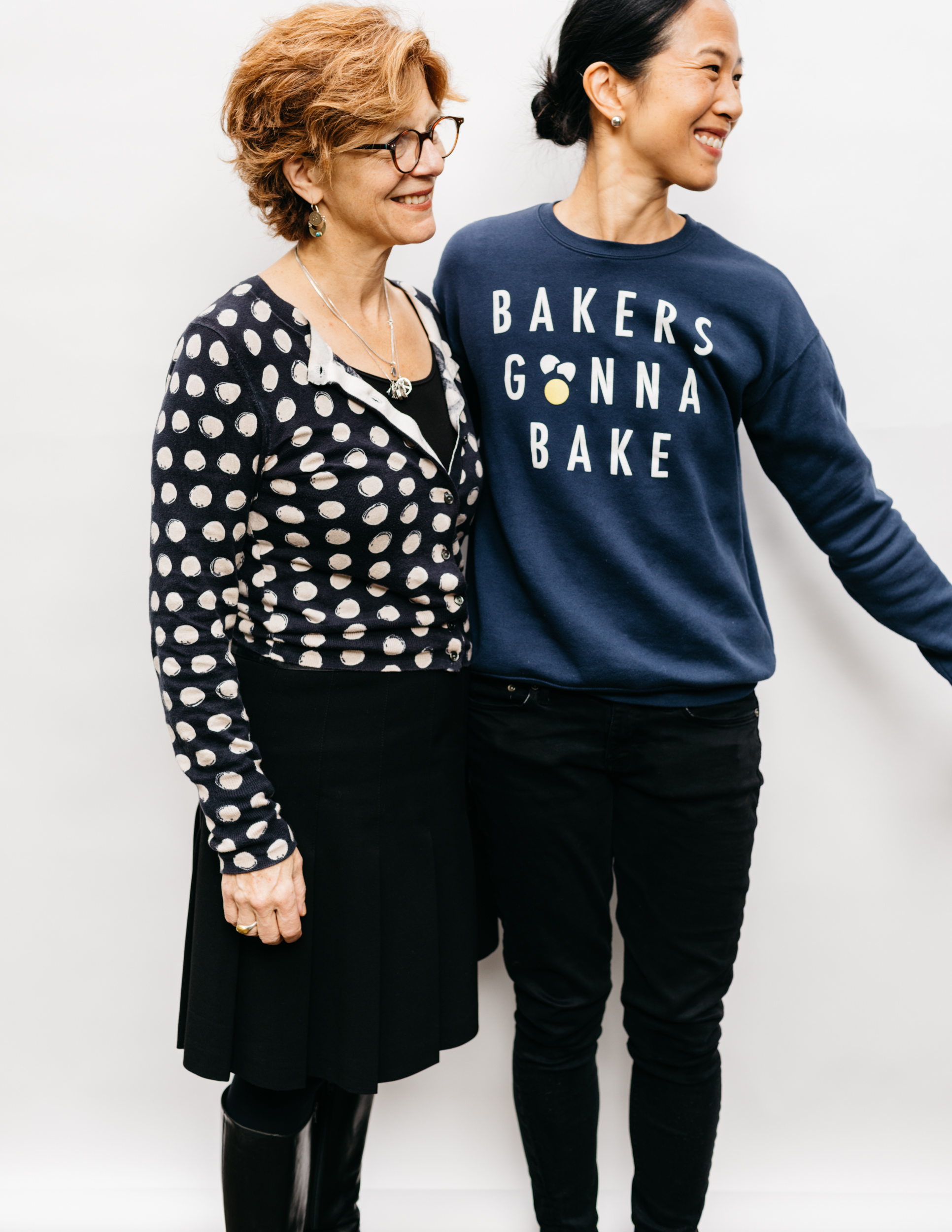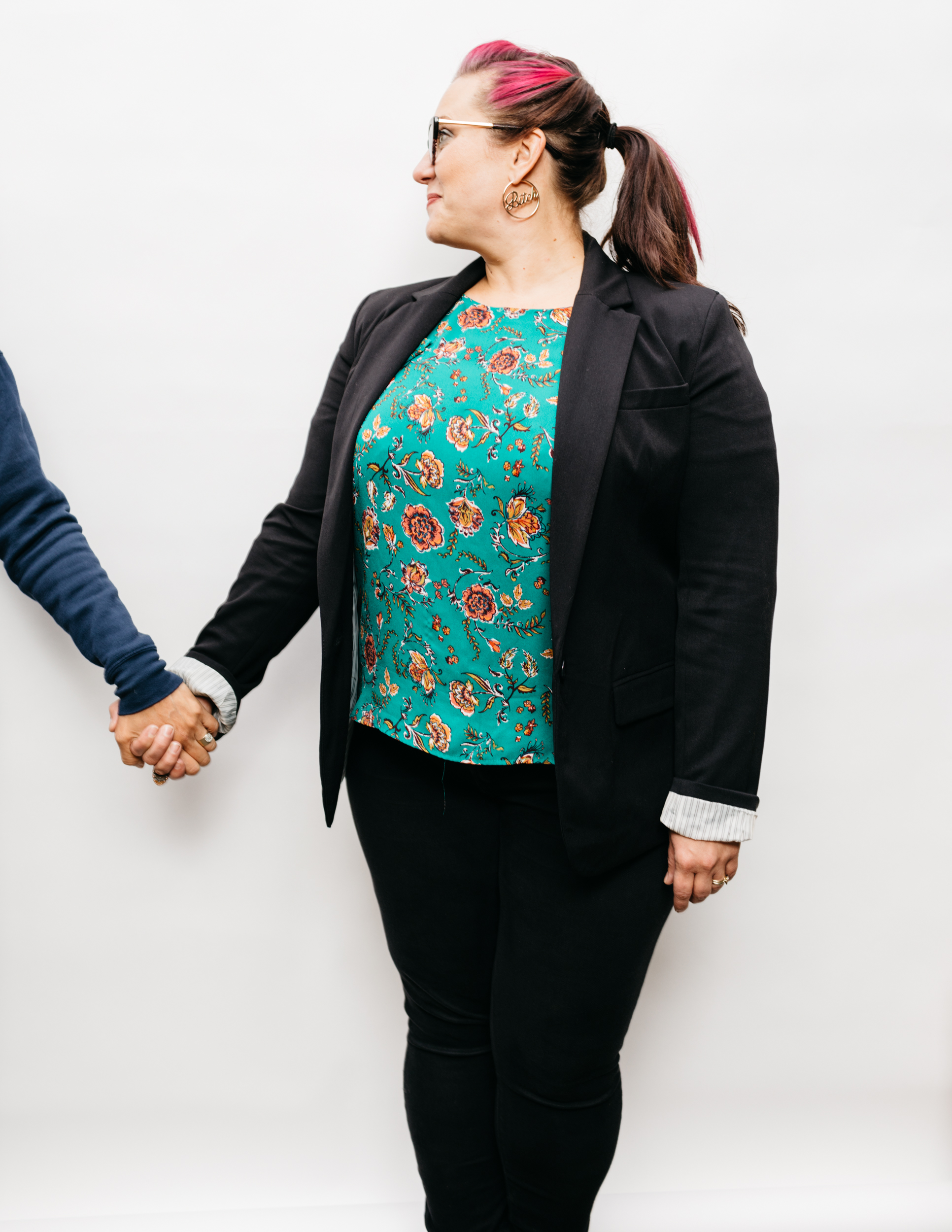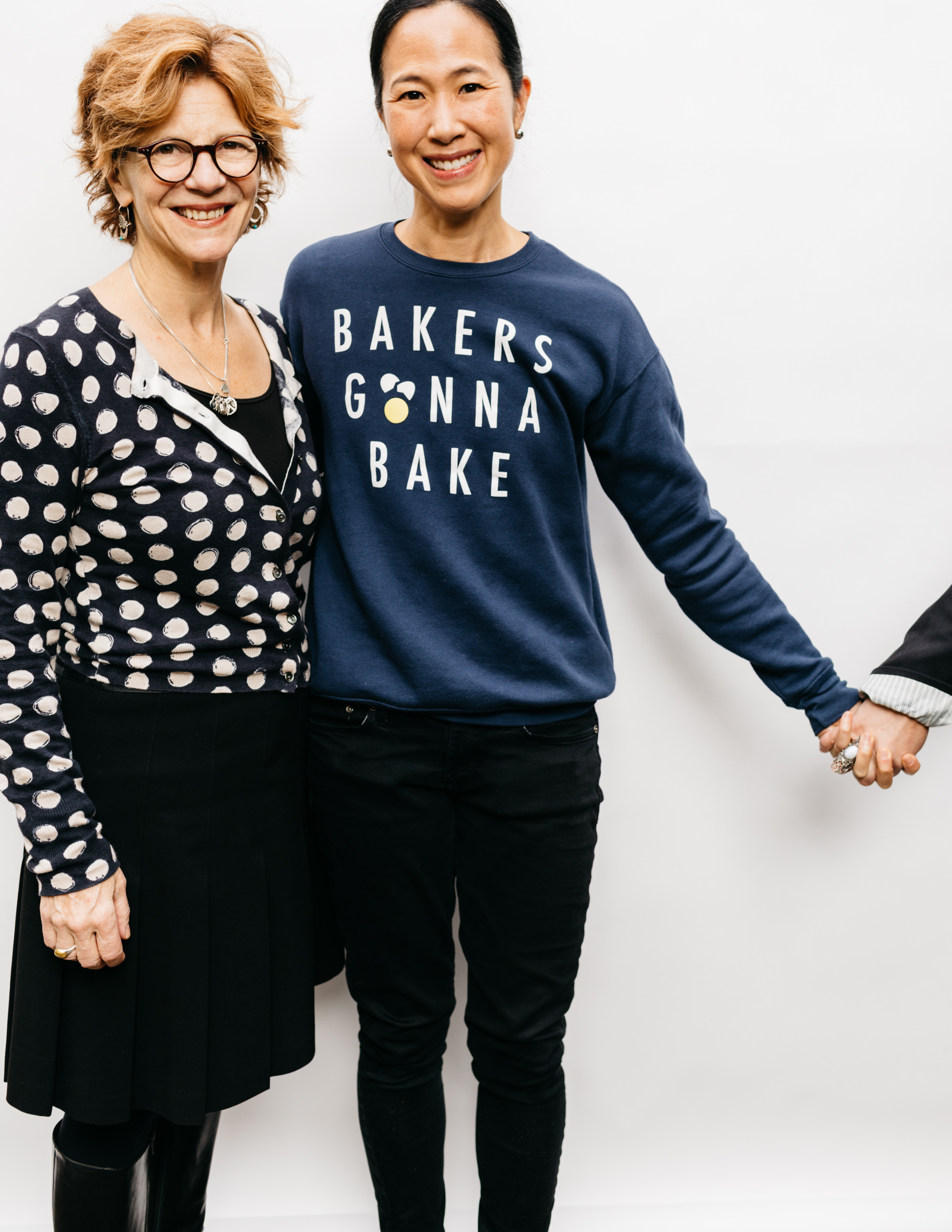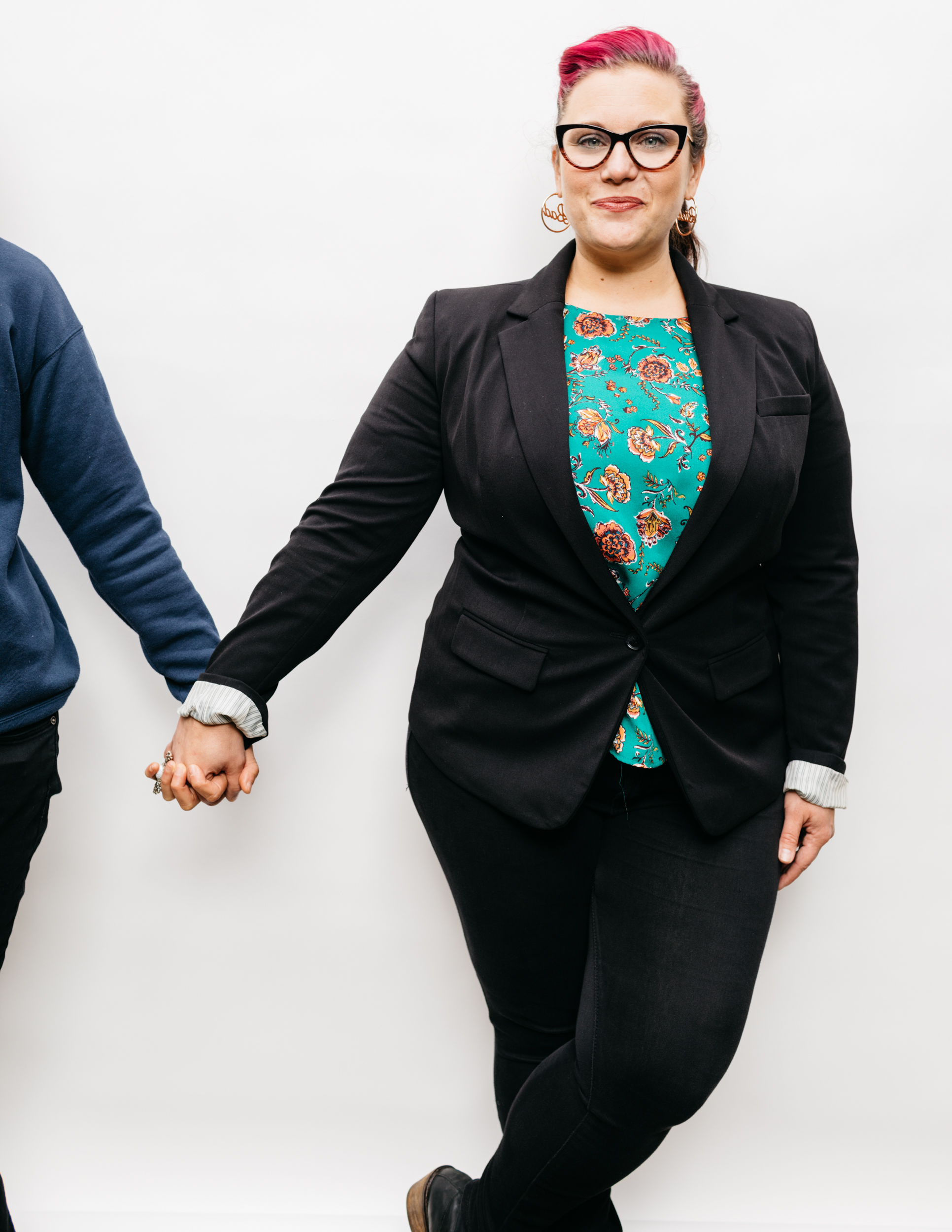Women Chefs Pass It On: Each Generation Nourishes the Next
Photo by Michael Piazza
Making our way to the back corner of Flour Bakery + Café in Back Bay, chef-restaurateur-all-around culinary powerhouse Jody Adams reminds me, “We have legacy, you know.”
Waiting to join us for a long, lively and laugh-filled discussion are the rest of that three-generation legacy: Joanne Chang, who worked for Adams as pastry chef at Rialto early in her career, and Karen Akunowicz, who until earlier this year was executive chef at Myers + Chang.
The three share a culinary family tree that stretches back to Boston’s modern culinary “Founding Mothers”: Karen to Joanne to Jody to Lydia to Julia. It’s likely that only in Boston could you trace a lineage of female chefs so influential that no last names are needed.
That’s the reason for this conversation: to discuss Boston’s unique history of women in leadership roles in the often male-dominated world of restaurant kitchens. Jody, Joanne and Karen are more than up to the task.
Among them, they have four James Beard Awards: Karen and Jody both won this year; it was Jody’s second. They own 14 restaurants: Jody co-owns Porto, Trade and three Saloniki locations; Joanne co-owns eight Flour locations as well as Myers + Chang. The restaurant count will reach 15 later this year when Karen opens her first solo venture, Fox and the Knife. They’ve written cookbooks, beaten Bobby Flay and competed to become “Top Chefs.” They’ve also managed thousands of employees and logged endless hours running some of the best restaurants in the city.
More than 30 years after Jody first ventured into a Boston restaurant kitchen, the three sat down to talk about the legacy they share.
Edible Boston: When did you first work in a restaurant led by a women chef?
Jody Adams: I didn’t know anything about restaurants; I’d hardly been in a restaurant. But I knew how to cook because I worked for a catering company and a gourmet food store. I had the good fortune of meeting Julia Child. She was doing a Planned Parenthood event and I washed dishes.
When I was about 25, I was unhappy in my life, in a marriage and in my work. So I decided I’d go to Boston and get a job in a restaurant. It was the early ’80s. I had read about and heard about male chefs. And so I was terrified. I heard they throw pots and pans and yell at you and thought, “That’s not going to be for me.”
Julia re-entered my life and said, “You have to work with Lydia Shire.” I was really fortunate. Gordon [Hamersley] was the sous chef [at Seasons at the Bostonian Hotel]. Lydia obviously set the tone because she was the leader. It was a kitchen of respect. Women could do anything. There weren’t any expectations that we should put up with anything.
Joanne Chang: My experience was the same as Jody. The first chef I worked with was Lydia. I didn’t know anything about the restaurant business. I wanted to work in a professional kitchen and Lydia was the first person to say yes. So to me, it was just what I knew. You work in a restaurant and your chef was female and the sous chef was female and the day chef was also female. I toggled back and forth [between working for male and female chefs], but it never occurred to me that women couldn’t or shouldn’t be chefs or owners, because it was what I knew.
Karen Akunowicz: I worked in the front of the house for a long time before working in the kitchen. My first job was at a female-owned restaurant with a female chef. It was Ten Tables in Jamaica Plain. I was thinking about this the other day: Primarily I’ve worked in female-owned or run kitchens.
Jody Adams: There’s the saying “You can’t be what you don’t see.” That’s a very, very important notion. In this town, you could because you saw Julia Child. You saw Lydia Shire. You saw Odette Berry. At Upstairs on the Square there were Mary-Catherine Deibel and Deborah Hughes. Rebecca Caras. There were lots of women.
EB: It seems unlikely to find this same history in other cities.
Karen: There are more [women in charge] in Boston than anywhere else. We might not be quite as progressive as other places, and so we get that Puritanical label. But in this way in particular, I think it’s different here.
Joanne: The women now who are line cooks or beginning bakers or even prep cooks, they can throw a stone and hit a restaurant or bakery that’s owned by a woman. It’s not a rare thing.
EB: All of you are very visible in the media, nationally, not just in Boston. When you are outside of Boston, do you feel there are different expectations for male and female chefs?
Joanne: For me that question is always so hard because it’s based on who you are as a person. I personally am not going to do some of the crazy things that other people do to be spotlighted in the media. Is it because I’m a woman or is it because I’m me? I don’t know.
Jody: I have a strong opinions, as you can imagine. I have nothing to lose anymore [laughs].
I remember doing Meals on Wheels in New York in Rockefeller Center. It’s outdoors and we were all having our pictures taken. There were hundreds of us, a lot of chefs. Maybe because I was shorter than a lot of people, I was close to the front. We were standing there and the chefs, the very well-known chefs, literally pushed me out of the way. I was shocked that there was no awareness.
Then we hosted a panel at Rialto in response to a centerfold photograph in Food & Wine [in 2014]. I think there were 13 chefs.
Joanne: It was for the Aspen Food & Wine Festival. You opened it up and there was this big ad, and there were no women.
Jody: There were two women, but neither of them was a chef. It just got to me. I thought, “After all these years, come on.” I decided I was going to pull together a panel. I invited [former Food & Wine Editor in Chief] Dana Cowin. I invited Victoria Budson, who runs the Women and Public Policy Program at the Kennedy School.
Somebody asked Dana, “So why aren’t there more women [in the magazine]?” She said they just aren’t there. Which is just not true. It’s not true. You have to find them and make sure that a spotlight is shone on them.
Joanne: Recently “Chef’s Table,” a show on Netflix, came up with a pastry chef special. There were four pastry chefs and only one of them was a woman. Especially in pastry, where it’s predominantly female, you would think they could find more than one woman.
Jody: How many women [chefs] do you know who have been arrested or had a temper tantrum so there’s an article about them in The New Yorker? If a woman does that, it is not going to be written about because it’s not sexy. Whereas if it’s David Chang or a local chef here, it’s sexy.
Karen: I think “sexy” is a real thing and “nice” is a real thing. People want women to be nice. We want you to be likable. We want you to smile. If you’re not those things, perhaps, you’re not looked on as favorably. I know when I’m working what my face looks like. I’m not mad. I’m not angry. I’m not a bitch. I’m not a bad person. Maybe I’m all those things [laughs], but I’m just working.
I have been very lucky that media and the press has been favorable, but that’s because Christopher and Joanne gave me the opportunity and said, “You can do this article, you can write this, you can do this event.”
EB: I’d like to talk about one of the issues I’ve heard from other female chefs and restaurant owners: the challenge of finding investors and getting access to capital. Karen, you’re in the middle of that right now.
Karen: Yes, I am. I think it’s the thing for me that’s the most challenging, the hardest, the most terrifying. One of many of the best things that I learned from Joanne is that money is just money and it’s just part of the business conversation.
When I needed to go look for investors, I was terrified and I felt like no one was going to give me money. I sat down with a friend of mine who works for Brown Brothers Harriman. She writes their newsletter called Women and Wealth. I said, “I need to start raising money and I don’t even know how to ask for it.” She said, “Well, I can’t speak to raising [money] for restaurants because that’s not what our clients do, but I can definitely walk you through that process.” And she did. That prepared me to have those conversations.
I got a lot of questions about who is running the business of the restaurant. And I said, “Me.” They said, “What qualifications do you have?” I said, “I have gone to the Joanne Chang school of business for the last seven years.”
Joanne: It’s very interesting that you reached out to this woman. If she didn’t exist, if she didn’t write this newsletter, you wouldn’t have had her to reach out to. I think a male chef in the same position, having never raised money, might have more opportunities to reach out to somebody that they know that will help them because most people in money right now are men, white men.
EB: Since there are already many woman-run restaurants in Boston, how has the community reacted to your opening Fox and the Knife?
Karen: There’s a theory of not enough—that there’s not enough for everybody so I have to keep mine for me, that I have to not reach out or include somebody else. But I very much believe—in all aspects of life—the more you give, the more there is.
The people who have been so helpful to me are people who own their own restaurants—who really don’t need another restaurant taking staff, opening in the city. Tiffani Faison and Kelly Walsh have been so helpful. They were, like, “Yes, of course you should have your own restaurant. What can we do to help?” Cassie Piuma did the same. Jody has been so helpful to me. Joanne and Christopher, of course. But there have been so many people. Mary Dumont, who said, “Do you have a lawyer? Here’s the name of my lawyer.” And people just checking in on me and saying “How are you doing?” I have found so much generosity from female chefs in this city and that really kind of tipped the scales from that theory of not enough. That’s pretty cool, I think.
EB: The three of you have clearly benefited tremendously from having mentors. How do you think about passing that on to the next generation?
Joanne: I tell everybody who works for us that at some point, hopefully far in the future, they’re going to leave and I hope they look back at this experience as one of the best experiences of their lives. I hope that they’ve learned how to be a good teammate, that they’ve learned what it means to be hospitable, thankful, grateful, all of those things.
In one way, the work we do is pretty black and white. But there’s so much more behind it that we can and want to do. So, I view my responsibility as teaching and showing and guiding and mentoring people so that they learn these skills and then go off and do wonderful things.
Jody: So I think that the mentoring wasn’t, in the early days, conscious. I needed to get this group of people to work together and there were a lot of things I did that didn’t work. What did work for me was finally learning to step back and say, “If this isn’t working [then I need to] start here.” It was just purely out of necessity because I was fucking up right, left and sideways. I had to figure it out.
Joanne: I also think, for you, it’s in your nature. I don’t think when I worked for you, you were like, “I’m going to mentor Joanne.” But every time I had an issue, I knew that you would listen to me, guide me. I still quote you for a ton of things. I still tell everybody the story that when I worked the dessert station and I was stressed out and was freaking out and was yelling at everybody, you would come over and say, “Joanne, it’s just dinner.” I tell every single Flour person that.
Karen: She does. She does tell that story.
Joanne: Even if back then you hadn’t thought about it, you were naturally just wanting to help those around you, male or female, get to wherever it was they were trying to go. So, thank you.
Interview was condensed for length and edited for clarity.
This story appeared in the Winter 2019 issue.





